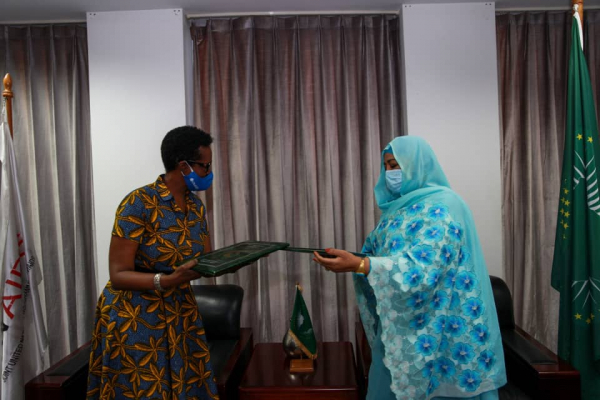ADDIS ABABA, 16 March 2021— UNAIDS and the African Union today signed a new Memorandum of Understanding (MoU) to reinforce their partnership and to recommit Member States to end AIDS through the Catalytic Framework to End AIDS, TB and Eliminate Malaria in Africa by 2030.
The MoU commits partners to work towards addressing the socio-economic and political impact of HIV in Africa and accelerate Universal Health Coverage and taking AIDS out of isolation. It will pave the way for more resilient, agile and inclusive health systems in Africa.
“The renewed MoU between the African Union and UNAIDS opens new windows of cooperation and new opportunities for ending AIDS in Africa. We need to deliver on this promise—it is doable,” said Amira Elfadil Mohammed Elfadil, Commissioner for the Department of Health, Humanitarian Affairs and Social Development, at the signing ceremony.
The Department of Health, Humanitarian Affairs and Social Development, formerly known as the Department of Social Affairs, coordinates AU Commission departments and organs to ensure that HIV remains a continental priority and is integrated into the broader development, human rights, humanitarian, and peace and security agenda of the African Union.
“I am delighted to sign the renewed Memorandum of Understanding with the African Union,” said UNAIDS Executive Director, Winnie Byanyima. “The African Union is one of UNAIDS’ most important partners. I look forward to reinforcing our relationship to put communities at the centre of the response to HIV, address other health challenges such as COVID-19 and reduce inequalities that increase people’s vulnerability.”
2021 is a pivotal year as Member States are expected to recommit to the AIDS response with the adoption of a new Political Declaration in June. The partnership agreement with the African Union is being signed as the continent grapples with over-burdened and insufficiently financed health systems in the face of the COVID-19 pandemic.
The new Global AIDS Strategy 2021‒2026 will contain targets for 2025 that aim to close inequalities that drive the AIDS epidemic and put people at the centre to get the world on track to end AIDS. It will guide stakeholders such as the African Union to unite countries, communities and partners to take action to accelerate progress in the AIDS response.
Contact
UNAIDS Johannesburg | Natalie Ridgard | tel. +27 83 408 0851 | This email address is being protected from spambots. You need JavaScript enabled to view it.
UNAIDS Addis Ababa | Agnes Kante | tel. +251 (0) 9 11 50 22 27 | This email address is being protected from spambots. You need JavaScript enabled to view it.
UNAIDS
The Joint United Nations Programme on HIV/AIDS (UNAIDS) leads and inspires the world to achieve its shared vision of zero new HIV infections, zero discrimination and zero AIDS-related deaths. UNAIDS unites the efforts of 11 UN organizations—UNHCR, UNICEF, WFP, UNDP, UNFPA, UNODC, UN Women, ILO, UNESCO, WHO and the World Bank—and works closely with global and national partners towards ending the AIDS epidemic by 2030 as part of the Sustainable Development Goals. Learn more at unaids.org and connect with us on Facebook, Twitter, Instagram and YouTube.
